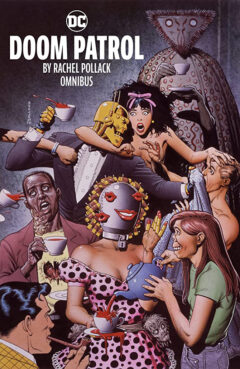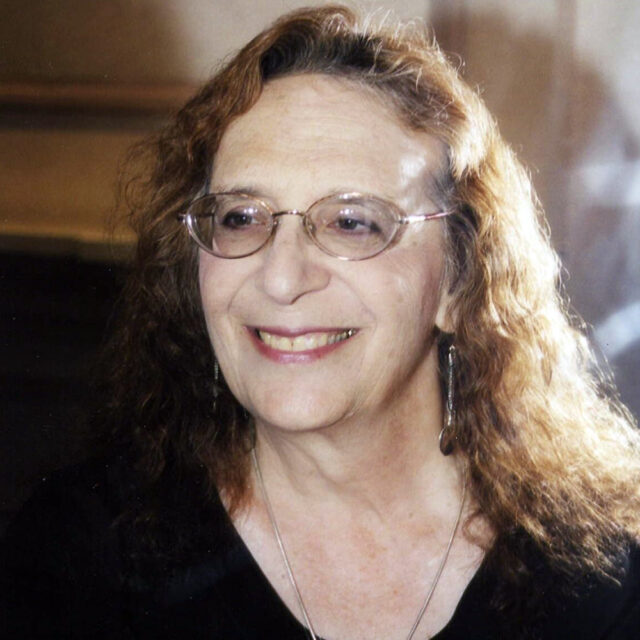(RNS) — Rachel Pollack, a prolific writer about tarot and an early activist for transgendered people’s rights, died April 7. She was 77.
Pollack’s wife, Judith Zoe Matoff, shared the news on social media, saying that Pollack, who had been battling non-Hodgkin’s lymphoma, died peacefully after “a touching ceremony called Hand to Heart,” surrounded by a circle of family and friends.
Beloved for her science fiction and fantasy writing, both in novels and comic books, she began speaking out for “transvestites, transsexuals and drag queens” at a time when the trans community was largely unseen, co-writing a 1972 manifesto titled “Don’t Call Me Mister, You F—-ing Beast.”
She did it all with a sense of humor, according to friends. “I hope that part of Rachel’s legacy both as activist and mystic will have been a serious commitment to playfulness and generosity of spirit,” wrote Roz Kaveney, the co-author of the manifesto, in a tweet.

“Seventy-Eight Degrees of Wisdom” by Rachel Pollack. Courtesy image
“The whole question of (gender) roles needs to be examined,” wrote Pollack and Kaveney, insisting that transgendered people “can contribute to a new understanding of how they operate.” They added, “The important thing is, no one should tell you, as a man or a woman, this is the role you have to play, and you have to play it all the time.”
Born in Brooklyn, New York, to a Jewish family in 1945, Pollack moved to Europe in 1971 and stayed for 19 years, during which time she transitioned. While living in the United Kingdom, she helped organize an activist group for trans people.
In a 2022 interview Pollack said that in the single year of 1971 she discovered tarot, had her first story published, moved to Europe and came out as trans and a lesbian. “My whole life changed in one year. It was an amazing year. A year of my life taking off,” she said.
Her first novel, “Golden Vanity,” was published in 1980, the same year she released her first book on tarot, “Seventy-Eight Degrees of Wisdom,” which would go on to become a bestseller and is now in its 40th printing.
In 1989, she received an Arthur C. Clarke Award in science fiction for her novel “Unquenchable Fire.” In that tale, as in many of her works, Pollack seamlessly combined mysticism, magic, mythology and reality.
After returning to the U.S. in 1990, Pollack began writing the monthly comic “Doom Patrol” for Vertigo, an imprint of DC Comics. Her run lasted 25 issues, and “Doom Patrol” would become one of her most recognized and important contributions to comic book art.

“Doom Patrol” by Rachel Pollack. Image courtesy of DC Comics
Within the comic book’s unique visual format, she pushed boundaries of representation and injected powerful conversations about gender and sexuality. For the comic, Pollack created the first transgender superhero, Kate “Coagula” Godwin.
Pollack continued to practice and teach tarot and created both tarot card decks, such as the Shining Tribe Tarot and the Jewish-themed Raziel Tarot, and tarot guides, including “Tarot Wisdom” and “The New Tarot Handbook.”
She believed that tarot was open to anyone interested in guidance and was an outspoken advocate for the practice. In a 2009 interview, she wrote, “We live in exile from our true selves — and the Tarot forms a blueprint of our return.”
Pollack’s work has inspired many young tarot readers in the same way that her comics and activism inspired young people in the queer community.
In a tribute, Theresa Reed wrote, “(Pollack’s) iconic work will continue to shine on forever, inspiring future generations of Tarot lovers.”
In a 2015 blog post, Pollack explained why tarot was so compelling to her. “The great Italian writer, Italo Calvino, wrote, ‘The tarot is a machine for constructing stories,’ More broadly, a famous Hasidic saying tells us ‘God made humans because God loves stories.’”
The quotes sum up her lifelong drive to tell stories. “Each card seemed a frozen moment in a story,” she wrote.
On hearing of her death, the novelist Neil Gaiman, longtime friend and colleague, tweeted, “May you, whoever you are, have a life like Rachel’s, one that changes things for people, a life where you follow your star and leave a more interesting world behind you. And may you, like Rachel, never lose your sense of humour.”





